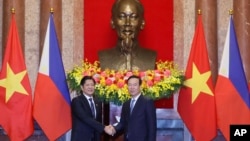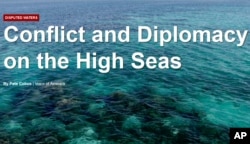Vietnam and the Philippines agreed on Tuesday to boost cooperation between their two coast guards to prevent incidents in the South China Sea, waters claimed in their entirety by Beijing.
Both Southeast Asian nations dispute China’s claim to the resource-rich maritime territory that is a major shipping route, and each nation has had tense run-ins with China in the strategic waterway.
The two memoranda of understanding on maritime cooperation were announced during a state visit to Hanoi by Philippine President Ferdinand Marcos Jr. and are “aimed at strengthening the understanding, mutual trust, and confidence between the two parties," his office said in a statement.
The deals cover "incident prevention in the South China Sea" and "maritime cooperation" among coast guards, according to a Vietnamese official at a formal ceremony in the country's presidential palace.
Marcos and Vietnam President Vo Van Thuong also agreed to strengthen existing maritime cooperation mechanisms, notably the Joint Commission on Maritime and Ocean Affairs at the deputy-minister level.
They will also enhance communication between coast guard commands and adopt other measures to ensure the safety and security of fishermen from both countries, as well as to solve amicably any unexpected incidents at sea, Viet Nam News reported.
The two countries also agreed to boost trade and investment and signed a key deal on rice.
China’s Ministry of Foreign Affairs did not respond to requests for comment made by VOA Vietnamese. China’s state-run People’s Daily Online said on Tuesday, “If Vietnam and the Philippines cooperate in certain areas to the detriment of China's interests in the South China Sea, it will only irritate the situation in the South China Sea and make the risk of conflict higher.”
Ha Hoang Hop, an associate senior fellow at the Singapore-based ISEAS-Yusof Ishak Institute, called the agreements “an important step forward, affirming the interest of both the Philippines and Vietnam to use all peaceful means to respond to China's gray zone strategy.”
Ha was referring to Beijing’s activities that are designed to avoid the threshold of triggering major conflict. He spoke to VOA Vietnamese in a telephone interview Tuesday from.
“China will continue to cause tension and harassment against the Philippines and Vietnam,” said Ha. “But these two agreements between the Philippines and Vietnam are completely consistent with international law, the 1982 U.N. Convention on the Law of the Sea. So, China's reactions will have no effect.”
Marcos raised his concerns over the long simmering disputes and cited increasingly aggressive actions by the Chinese coast guard in a call Tuesday to Vietnamese Prime Minister Pham Minh Chinh.
“There continue to be … unilateral and illegal actions that violate our sovereignty, sovereign rights and jurisdiction and exacerbate tensions in the South China Sea,” Marcos said.
Transcripts of his remarks were issued by the presidential office in Manila.
Hoang Viet, an expert on South China Sea disputes at the Vietnam National University in Ho Chi Minh City, was skeptical when asked whether the agreements amount to the two countries forming a “united front” against China.
“If Vietnam and the Philippines really created a united front to fight China, China would find every way to respond strongly,” he told VOA Vietnamese in a telephone interview on Tuesday.
“But with the two sides only signing memoranda of understanding, it is not enough to form a united front to fight China. Vietnam has also tried to avoid this, because Vietnam does not want to create confrontation with China at this time,” Hoang said.
Some material for this report came from Reuters and The Associated Press.








